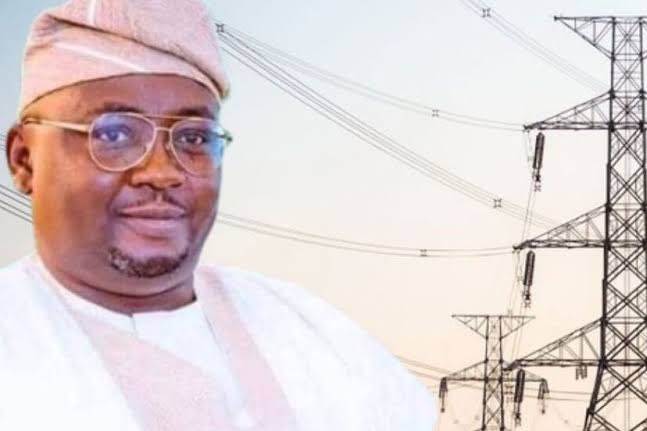Adebayo Adelabu, minister of power, says Nigeria will generate and distribute 8,000 megawatts (MW) of electricity before the end of President Bola Tinubu’s first term in 2027.
The minister spoke during a ministerial press briefing hosted by Mohammed Idris, minister of information and national orientation, on Thursday.
Adelabu explained that the Tinubu administration increased power generation by 1,700 megawatts in two years, whereas it previously took the country 35 years to achieve a 2,000 megawatt increase.
He assured that if the new trajectory is sustained, before the end of the Tinubu administration in 2027, the power ministry will generate and distribute 8,000 megawatts of power or more.
“In the country’s history of the power sector, let me thank our agencies, our operators, that this was achieved during our time,” Adelabu said.
“We have crossed the bar of 6,000 megawatts for the first time in the history of Nigeria’s power sector.
“That is not enough, this achievement was followed by a peak generation evacuation of 5,801.44 megawatts on 4th of March 2025, which also saw an impressive daily energy output, the highest ever, 128,370.75 megawatts per day on that very day.
“We’ve always been at 118,000 to 119,000 megawatts on a daily basis, but we achieved 128,000. That is the highest energy ever consumed in a day since the power sector came to being in Nigeria, and we are proud to achieve this.
“In summary, the average daily power generated and distributed in the first quarter of 2025 was 5,700 megawatts.
“Compared with what we met when we resumed office, average of 4,100 megawatts achieved in the third quarter of 2023, this indicate a growth of 1,600 megawatts, nearly 40% growth since we assumed office at the ministry.
“This is very important to us. I came into office August 2023, and between July, August, and September, what we achieved was 4,100 generated, evacuated, transmitted, and distributed, and it’s always been like that. Even though there were spikes in the past, it would go up, it would come down.
“It was not sustainable, and it took the country about 40 years. In 1984, when Alhaji Rilwanu Lukman was the federal minister of power, we achieved 2,000 megawatts of power generation.
“We took this to 4,000, about 2016-2022, so it took the country between 35 to 40 years to achieve 2,000 incremental generation.
“But this administration, thanks to our Mr. President for his support, in one and a half years, we grew this from 4,100 to a peak generation of 5,800; 1,700 increase in one and a half years.
“What we are saying is that past administrations have their own positives, creation of the NIPPs, a lot of things that they achieved.
“If they have been adding at least 1,000 megawatts of power since 1999, we’d be talking about 26,000 megawatts, plus 4,000, that would be about 30,000 megawatts of power in Nigeria today, but we cannot keep dwelling in the past.
“It’s the way forward. Now that we have created the trajectory, if we sustain this trajectory, I can assure you that before the end of this administration in 2027, we should be able to generate and distribute nothing less than 8,000 megawatts of power.
“So, given that it took the country almost 40 years to achieve an incremental 2,000 megawatts average energy, we accomplished this.”
‘NATIONAL GRID STRONGER IN TINUBU’S ADMINISTRATION’
Adelabu explained that the national grid has been stronger in Tinubu’s administration, as the Transmission Company of Nigeria (TCN) strengthened the critical network by commissioning 61 new transformers.
“It is a huge grid to cover over 200 million people, and it’s been there for so long, and we know that the maintenance history has been poor, replacement history has been poor, expansion history has been poor,” the minister said.
“It is old, so collectively enabling our grid 8.7 gigawatt operational capacity, as of today, if we grow our generation to 8,700 megawatts, the grid can still carry it, thanks to the activities of the TCN and the FGN power company.
“Two years ago, once it gets to 5,000 megawatts, the grid collapses, then we have evacuated 5,800 megawatts successfully without the grid blinking, it was still stable, so we can transport 8,700 megawatts.
“To strengthen this critical network, TCN commissioned 61 new transformers, totalling 5,589 MVA in 2024. Followed by nine additional transformers in quarter one of 2025 across key locations in Lagos, Benin, Bauchi, Oshogbo, Kano and Kaduna, we have the list of the sites, I once mentioned that TCN had over 100 unfinished projects.
“In the 2025 appropriation, we already have N25 billion to support TCN to complete some of these projects and that will also improve power supply.
“Beyond TCN, we have the activities of the presidential power initiative, which is being executed by the FGN power company. The pilot phase delivered infrastructure across 13 locations, adding 700 megawatts to the national grid.
“We experience a number of grid disturbances towards the end of last year; but since January up till today, four months into the new year, we have not seen any major disturbance to the grid.
“I can assure you, we do everything possible to maintain and sustain the current scenario. If there’s any little disturbance, our turnaround time is being worked upon, within one to two hours, the grid will be up.”
Adelabu said another remarkable initiative is the progress made towards regionalising the national grid, adding that the eastern and western supergrid approvals currently in progress will revolutionise the national grid and reduce failures.
The minister added that Nigeria needs regionalisation of the national grid so that if there is a problem in one part of the country, it will not affect other parts.










